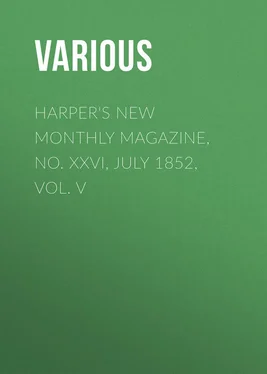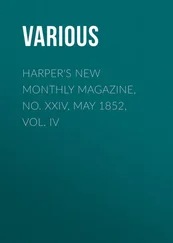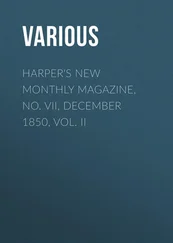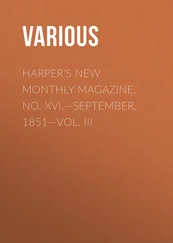Various - Harper's New Monthly Magazine, No. XXVI, July 1852, Vol. V
Здесь есть возможность читать онлайн «Various - Harper's New Monthly Magazine, No. XXVI, July 1852, Vol. V» — ознакомительный отрывок электронной книги совершенно бесплатно, а после прочтения отрывка купить полную версию. В некоторых случаях можно слушать аудио, скачать через торрент в формате fb2 и присутствует краткое содержание. Издательство: Иностранный паблик, Жанр: periodic, foreign_edu, на английском языке. Описание произведения, (предисловие) а так же отзывы посетителей доступны на портале библиотеки ЛибКат.
- Название:Harper's New Monthly Magazine, No. XXVI, July 1852, Vol. V
- Автор:
- Издательство:Иностранный паблик
- Жанр:
- Год:неизвестен
- ISBN:нет данных
- Рейтинг книги:4 / 5. Голосов: 1
-
Избранное:Добавить в избранное
- Отзывы:
-
Ваша оценка:
- 80
- 1
- 2
- 3
- 4
- 5
Harper's New Monthly Magazine, No. XXVI, July 1852, Vol. V: краткое содержание, описание и аннотация
Предлагаем к чтению аннотацию, описание, краткое содержание или предисловие (зависит от того, что написал сам автор книги «Harper's New Monthly Magazine, No. XXVI, July 1852, Vol. V»). Если вы не нашли необходимую информацию о книге — напишите в комментариях, мы постараемся отыскать её.
Harper's New Monthly Magazine, No. XXVI, July 1852, Vol. V — читать онлайн ознакомительный отрывок
Ниже представлен текст книги, разбитый по страницам. Система сохранения места последней прочитанной страницы, позволяет с удобством читать онлайн бесплатно книгу «Harper's New Monthly Magazine, No. XXVI, July 1852, Vol. V», без необходимости каждый раз заново искать на чём Вы остановились. Поставьте закладку, и сможете в любой момент перейти на страницу, на которой закончили чтение.
Интервал:
Закладка:
To the Arab the chase of the ostrich has a double attraction – pleasure and profit; the price obtained for the skins well compensates for the expenses. Not only do the rich enjoy the pursuit, but the poor, who know how to set about it, are permitted to participate in it also. The usual plan is for a poor Arab to arrange with one who is opulent for the loan of his camel, horse, harness, and two-thirds of all the necessary provisions. The borrower furnishes himself the remaining third, and the produce of the chase is divided in the same proportions.
The ostrich, like many other of the feathered tribe, has a great deal of self-conceit. On fine sunny days a tame bird may be seen strutting backward and forward with great majesty, fanning itself with its quivering, expanded wings, and at every turn seeming to admire its grace, and the elegance of its shadow. Dr. Shaw says that, though these birds appear tame and tractable to persons well-known to them, they are often very fierce and violent toward strangers, whom they would not only endeavor to push down by running furiously against them, but they would peck at them with their beaks, and strike with their feet; and so violent is the blow that can be given, that the doctor saw a person whose abdomen had been ripped completely open by a stroke from the claw of an ostrich.
To have the stomach of an ostrich has become proverbial, and with good reason; for this bird stands enviably forward in respect to its wonderful powers of digestion, which are scarcely inferior to its voracity. Its natural food consists entirely of vegetable substances, especially grain; and the ostrich is a most destructive enemy to the crops of the African farmers. But its sense of taste is so obtuse, that scraps of leather, old nails, bits of tin, buttons, keys, coins, and pebbles, are devoured with equal relish; in fact, nothing comes amiss. But in this it doubtless follows an instinct: for these hard bodies assist, like the gravel in the crops of our domestic poultry, in grinding down and preparing for digestion its ordinary food.
There was found by Cuvier in the stomach of an ostrich that died at Paris, nearly a pound weight of stones, bits of iron and copper, and pieces of money worn down by constant attrition against each other, as well as by the action of the stomach itself. In the stomach of one of these birds which belonged to the menagerie of George the Fourth, there were contained some pieces of wood of considerable size, several large nails, and a hen's egg entire and uninjured, perhaps taken as a delicacy from its appetite becoming capricious. In the stomach of another, beside several large cabbage-stalks, there were masses of bricks of the size of a man's fist. Sparrman relates that he saw ostriches at the Cape so tame that they went loose to and from the farm, but they were so voracious as to swallow chickens whole, and trample hens to death, that they might tear them in pieces afterward and devour them; and one great barrel of a bird was obliged to be killed on account of an awkward habit he had acquired of trampling sheep to death. But perhaps the most striking proof of the prowess of an ostrich in the eating way, is that afforded by Dr. Shaw, who saw one swallow bullet after bullet as fast as they were pitched, scorching hot, from the mould.
A DULL TOWN
Putting up for the night in one of the chiefest towns of Staffordshire, I find it to be by no means a lively town. In fact, it is as dull and dead a town as any one could desire not to see. It seems as if its whole population might be imprisoned in its Railway Station. The Refreshment-room at that station is a vortex of dissipation compared with the extinct town-inn, the Dodo, in the dull High-street.
Why High-street? Why not rather Low-street, Flat-street, Low-spirited-street, Used-up-street? Where are the people who belong to the High-street? Can they all be dispersed over the face of the country, seeking the unfortunate Strolling Manager who decamped from the mouldy little theatre last week, in the beginning of his season (as his play-bills testify), repentantly resolved to bring him back, and feed him, and be entertained? Or, can they all be gathered to their fathers in the two old church-yards near to the High-street – retirement into which church-yards appears to be a mere ceremony, there is so very little life outside their confines, and such small discernible difference between being buried alive in the town, and buried dead in the town-tombs? Over the way, opposite to the staring blank bow windows of the Dodo, are a little ironmonger's shop, a little tailor's shop (with a picture of the fashions in the small window and a bandy-legged baby on the pavement staring at it) – a watchmaker's shop, where all the clocks and watches must be stopped, I am sure, for they could never have the courage to go, with the town in general, and the Dodo in particular, looking at them. Shade of Miss Linwood, erst of Leicester-square, London, thou art welcome here, and thy retreat is fitly chosen! I myself was one of the last visitors to that awful storehouse of thy life's work, where an anchorite old man and woman took my shilling with a solemn wonder, and conducting me to a gloomy sepulchre of needlework dropping to pieces with dust and age, and shrouded in twilight at high noon, left me there, chilled, frightened, and alone. And now, in ghostly letters on all the dead walls of this dead town, I read thy honored name, and find, that thy Last Supper, worked in Berlin Wool, invites inspection as a powerful excitement!
Where are the people who are bidden with so much cry to this feast of little wool? Where are they? Who are they? They are not the bandy-legged baby studying the fashions in the tailor's window. They are not the two earthy plow-men lounging outside the saddler's shop, in the stiff square where the Town Hall stands, like a brick-and-mortar private on parade. They are not the landlady of the Dodo in the empty bar, whose eye had trouble in it and no welcome, when I asked for dinner. They are not the turnkeys of the Town Jail, looking out of the gateway in their uniforms, as if they had locked up all the balance (as my American friends would say) of the inhabitants, and could now rest a little. They are not the two dusty millers in the white mill down by the river, where the great water-wheel goes heavily round and round, like the monotonous days and nights in this forgotten place. Then who are they? for there is no one else. No; this deponent maketh oath and saith that there is no one else, save and except the waiter at the Dodo, now laying the cloth. I have paced the streets, and stared at the houses, and am come back to the blank bow-window of the Dodo; and the town-clock strikes seven, and the reluctant echoes seem to cry, "Don't wake us!" and the bandy-legged baby has gone home to bed.
If the Dodo were only a gregarious bird – if it had only some confused idea of making a comfortable nest – I could hope to get through the hours between this and bed-time, without being consumed by devouring melancholy. But the Dodo's habits are all wrong. It provides me with a trackless desert of sitting-room, with a chair for every day in the year, a table for every month, and a waste of sideboard where a lonely China vase pines in a corner for its mate long departed, and will never make a match with the candlestick in the opposite corner if it live till doomsday. The Dodo has nothing in the larder. Even now, I behold the Boots returning with my sole in a piece of paper; and with that portion of my dinner, the Boots, perceiving me at the blank bow-window, slaps his leg as he comes across the road, pretending it is something else. The Dodo excludes the outer air. When I mount up to my bed-room, a smell of closeness and flue gets lazily up my nose like sleepy snuff. The loose little bits of carpet writhe under my tread, and take wormy shapes. I don't know the ridiculous man in the looking-glass, beyond having met him once or twice in a dish-cover – and I can never shave him to-morrow morning! The Dodo is narrow-minded as to towels; expects me to wash on a freemason's apron without the trimming; when I ask for soap, gives me a stony-hearted something white, with no more lather in it than the Elgin marbles. The Dodo has seen better days, and possesses interminable stables at the back – silent, grass-grown, broken-windowed, horseless.
Читать дальшеИнтервал:
Закладка:
Похожие книги на «Harper's New Monthly Magazine, No. XXVI, July 1852, Vol. V»
Представляем Вашему вниманию похожие книги на «Harper's New Monthly Magazine, No. XXVI, July 1852, Vol. V» списком для выбора. Мы отобрали схожую по названию и смыслу литературу в надежде предоставить читателям больше вариантов отыскать новые, интересные, ещё непрочитанные произведения.
Обсуждение, отзывы о книге «Harper's New Monthly Magazine, No. XXVI, July 1852, Vol. V» и просто собственные мнения читателей. Оставьте ваши комментарии, напишите, что Вы думаете о произведении, его смысле или главных героях. Укажите что конкретно понравилось, а что нет, и почему Вы так считаете.












